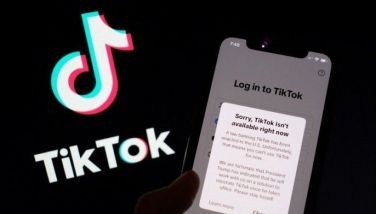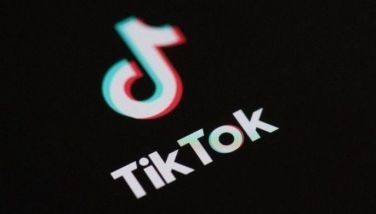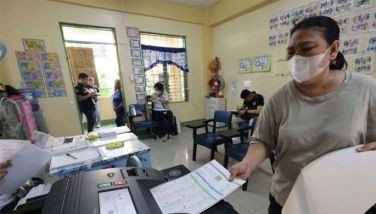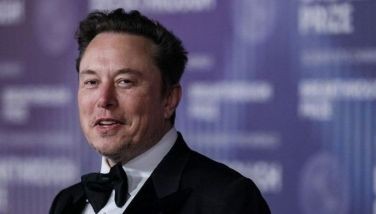Charting RP’s e-future
February 21, 2001 | 12:00am
What’s the future like for this country? Will it be rosy? Will it be bleak? Will it be high-tech?
If you ask the teenagers who participated in last week’s Ayala Young Leaders Congress (AYLC) in Tagaytay City, the future can either be rosy or bleak. But it will certainly be filled with all the high-tech gadgets that excite no end.
More than half of 73 AYLC participants, who came from at least 80 schools throughout the country, said in an informal poll that they see a future clouded with uncertainty. Twenty percent are optimistic and have high hopes, while about 18 percent believe that with the kind of situation the country is in now, the future can only be gloomy.
Jaime Augusto Zobel de Ayala or JAZA, the head of the Ayala Group of Companies, sees a promise, however, in the way the AYLC participants expressed their views.
"We have here teenagers who are more empowered, who are not afraid to say what they think," he said. "We’ve seen this kind of young people in EDSA during the People Power II. They are no longer contented with following orders. They want more participation in determining their future."
AYLC was born three years ago as the Ayala Group’s response to the times. Ramon F.R. Medina, head of Ayala’s corporate services, said the company wanted to improve the leadership quality of the country by training potential leaders among the youth.
In its first two stagings, the AYLC was able to make participants interact with achievers in various fields. Last year, its organizers invited a US-based Filipino who rose from being a mere copyboy or messenger to become one of the top editors of Time magazine.
"Filipinos deserve better leaders. Through the AYLC, we are preparing the youth to become better leaders," Medina said. "We’re giving them the right models to emulate."
This year, two of AYLC’s speakers are former Ayala executives now engaged in funding high-tech companies.
Jaime "Jim" Ayala and Cezar "Bong" Consing both trace their beginnings to an Ayala company before they became bigshots at McKinsey & Co. and JP Morgan Securities, respectively.
The two did their presentations together. Taking opposing sides, Ayala presented bleak prospects for the country while Consing painted a rosy future for Filipino technopreneurs.
The advent of new technologies is, indeed, big news to all. But it wasn’t necessarily good news for all countries.
In showing a negative view of the future, Jim Ayala laid down a scenario where only the "specialists," with specialized talents to offer, and the "King Kongs," meaning the big players, will survive.
He noted that as industries become fragmented, it will no longer be advisable to be a Jack-of-all-trades. Instead, he said, those with specialized skills and specialized businesses will be the ones who will set the trend.
"You can see it now. No single company ever manufactures an entire computer from scratch. You have one company specializing in making hard disks, you have one which only makes keyboards, and you have another which only makes monitors," he said.
He added that the ones who will be able to compete with the specialists are the King Kongs or those with billions of dollars in capital and hundreds of thousands of manpower.
"There are two winners in the New Economy – the specialists and the King Kongs. The problem is if you’re in the middle, if you’re neither a specialist nor a King Kong," he said.
The "middle" is where most Filipino companies are in today, Ayala said. He noted that the Philippines cannot boast of companies that can compete with, say, Microsoft, which specializes in software "What’s worse is Microsoft is not only a specialist. It has also become a King Kong. How can you ever compete with that?"
Ayala believes that to be able to survive, Filipino companies have to go "global." He advised AYLC participants to invest in things with "increasing returns," namely knowledge, relationship and reputation.
"You have to be a Tiger Woods or a Michael Jordan if you want to win big. You have to be the best," he stressed.
Ayala believes, however, that Filipino companies will have a harder time becoming the best in the world with the so-called "digital divide" getting wider everyday
"The digital divide and the gap between the rich and the poor is becoming wider and wider. This is one thing that troubles us. With no access to new technologies, it is virtually impossible to compete with the specialists and the King Kongs of the world," he said.
The future is not totally gloomy on Consing’s side though. Taking a dreamer’s stance, he raised the spirits of the AYLC participants by showing them opportunities available in the so-called New Economy.
He said the Philippines does not really have to follow the footsteps of more advanced countries. Instead, he advised young people to "leapfrog" into the future, into technologies hitherto unseen, and "partner" with the specialists and the King Kongs.
"I actually think this New Economy is presenting Filipino companies with awesome opportunities," he said. Consing explained that with the Internet, the world is now at everyone’s fingertips. "The Internet is a bridge that connects you to the specialists and the King Kongs. You grow by making connections," he said.
Consing began as an employee of the Bank of Philippine Islands and was sent by the company to JP Morgan 16 years ago. As an investment specialist, he quickly saw that people with good ideas did not necessarily need to have their own capital to start their businesses. "All you need is a good idea and access to technology. A good idea is good enough to start with," he said.
According to Consing, someone with just minimal capitalization can raise millions of pesos in funding from investors not only here but abroad. And he said those with good idea can forge partnerships with the specialists and the King Kongs to be able to grow.
But Consing admitted that this is only possible under an "open environment" where the government does not protect any crony or any business interest.
He recalled that as a child in the 1960s, he was told by his father that the IMF-World Bank had picked two countries to be ahead of everybody else in Asia. Those two countries were the Philippines and Burma which, ironically, are now lagging behind all the rest in the region.
"Why? Because the Philippines and Burma opted to be protectionists while other countries opened up their economies," he said.
After Ayala and Consing finished their presentation, they asked those in the audience to vote on which of the two futures they would want to have. And more than half of the AYLC participants shared Consing’s optimism.
Sixty-three percent of the 73 participants were one in saying that a rosy e-future for the country was only possible if the government would do the following:
• Foster an entrepreneurial spirit.
• Open the economy fast.
• Invest in education and training, and
• Provide fair rules, infrastructure and an enabling framework for technopreneurs.
The rest, though, said newly installed President Gloria Macapagal-Arroyo should do all four things but ensure that safety nets are available for industries that would be adversely affected by the economy’s change of focus.
One observer to the three-day congress said he was completely impressed by the participants’ keen understanding of the country’s present situation. "The future belongs to them. You can bet that with the right training, they’ll gonna make the future very exciting," he said.
If you ask the teenagers who participated in last week’s Ayala Young Leaders Congress (AYLC) in Tagaytay City, the future can either be rosy or bleak. But it will certainly be filled with all the high-tech gadgets that excite no end.
More than half of 73 AYLC participants, who came from at least 80 schools throughout the country, said in an informal poll that they see a future clouded with uncertainty. Twenty percent are optimistic and have high hopes, while about 18 percent believe that with the kind of situation the country is in now, the future can only be gloomy.
Jaime Augusto Zobel de Ayala or JAZA, the head of the Ayala Group of Companies, sees a promise, however, in the way the AYLC participants expressed their views.
"We have here teenagers who are more empowered, who are not afraid to say what they think," he said. "We’ve seen this kind of young people in EDSA during the People Power II. They are no longer contented with following orders. They want more participation in determining their future."
AYLC was born three years ago as the Ayala Group’s response to the times. Ramon F.R. Medina, head of Ayala’s corporate services, said the company wanted to improve the leadership quality of the country by training potential leaders among the youth.
In its first two stagings, the AYLC was able to make participants interact with achievers in various fields. Last year, its organizers invited a US-based Filipino who rose from being a mere copyboy or messenger to become one of the top editors of Time magazine.
"Filipinos deserve better leaders. Through the AYLC, we are preparing the youth to become better leaders," Medina said. "We’re giving them the right models to emulate."
This year, two of AYLC’s speakers are former Ayala executives now engaged in funding high-tech companies.
Jaime "Jim" Ayala and Cezar "Bong" Consing both trace their beginnings to an Ayala company before they became bigshots at McKinsey & Co. and JP Morgan Securities, respectively.
The two did their presentations together. Taking opposing sides, Ayala presented bleak prospects for the country while Consing painted a rosy future for Filipino technopreneurs.
In showing a negative view of the future, Jim Ayala laid down a scenario where only the "specialists," with specialized talents to offer, and the "King Kongs," meaning the big players, will survive.
He noted that as industries become fragmented, it will no longer be advisable to be a Jack-of-all-trades. Instead, he said, those with specialized skills and specialized businesses will be the ones who will set the trend.
"You can see it now. No single company ever manufactures an entire computer from scratch. You have one company specializing in making hard disks, you have one which only makes keyboards, and you have another which only makes monitors," he said.
He added that the ones who will be able to compete with the specialists are the King Kongs or those with billions of dollars in capital and hundreds of thousands of manpower.
"There are two winners in the New Economy – the specialists and the King Kongs. The problem is if you’re in the middle, if you’re neither a specialist nor a King Kong," he said.
The "middle" is where most Filipino companies are in today, Ayala said. He noted that the Philippines cannot boast of companies that can compete with, say, Microsoft, which specializes in software "What’s worse is Microsoft is not only a specialist. It has also become a King Kong. How can you ever compete with that?"
Ayala believes that to be able to survive, Filipino companies have to go "global." He advised AYLC participants to invest in things with "increasing returns," namely knowledge, relationship and reputation.
"You have to be a Tiger Woods or a Michael Jordan if you want to win big. You have to be the best," he stressed.
Ayala believes, however, that Filipino companies will have a harder time becoming the best in the world with the so-called "digital divide" getting wider everyday
"The digital divide and the gap between the rich and the poor is becoming wider and wider. This is one thing that troubles us. With no access to new technologies, it is virtually impossible to compete with the specialists and the King Kongs of the world," he said.
He said the Philippines does not really have to follow the footsteps of more advanced countries. Instead, he advised young people to "leapfrog" into the future, into technologies hitherto unseen, and "partner" with the specialists and the King Kongs.
"I actually think this New Economy is presenting Filipino companies with awesome opportunities," he said. Consing explained that with the Internet, the world is now at everyone’s fingertips. "The Internet is a bridge that connects you to the specialists and the King Kongs. You grow by making connections," he said.
Consing began as an employee of the Bank of Philippine Islands and was sent by the company to JP Morgan 16 years ago. As an investment specialist, he quickly saw that people with good ideas did not necessarily need to have their own capital to start their businesses. "All you need is a good idea and access to technology. A good idea is good enough to start with," he said.
According to Consing, someone with just minimal capitalization can raise millions of pesos in funding from investors not only here but abroad. And he said those with good idea can forge partnerships with the specialists and the King Kongs to be able to grow.
But Consing admitted that this is only possible under an "open environment" where the government does not protect any crony or any business interest.
He recalled that as a child in the 1960s, he was told by his father that the IMF-World Bank had picked two countries to be ahead of everybody else in Asia. Those two countries were the Philippines and Burma which, ironically, are now lagging behind all the rest in the region.
"Why? Because the Philippines and Burma opted to be protectionists while other countries opened up their economies," he said.
Sixty-three percent of the 73 participants were one in saying that a rosy e-future for the country was only possible if the government would do the following:
• Foster an entrepreneurial spirit.
• Open the economy fast.
• Invest in education and training, and
• Provide fair rules, infrastructure and an enabling framework for technopreneurs.
The rest, though, said newly installed President Gloria Macapagal-Arroyo should do all four things but ensure that safety nets are available for industries that would be adversely affected by the economy’s change of focus.
One observer to the three-day congress said he was completely impressed by the participants’ keen understanding of the country’s present situation. "The future belongs to them. You can bet that with the right training, they’ll gonna make the future very exciting," he said.
BrandSpace Articles
<
>
- Latest
Latest
Latest
January 19, 2025 - 12:39pm
By Alex Pigman | January 19, 2025 - 12:39pm
January 19, 2025 - 10:05am
By Alex Pigman | January 19, 2025 - 10:05am
January 6, 2025 - 11:05pm
January 6, 2025 - 11:05pm
December 1, 2024 - 3:59pm
December 1, 2024 - 3:59pm
Recommended

























